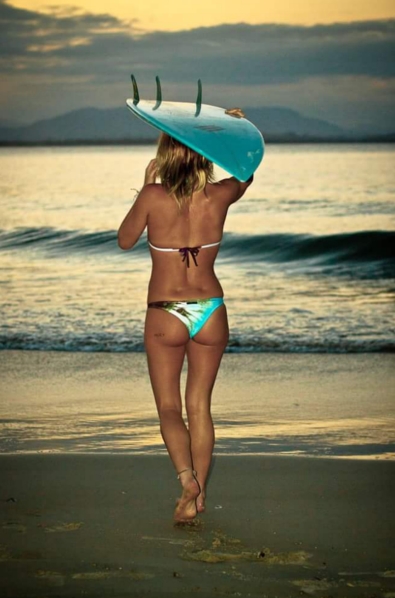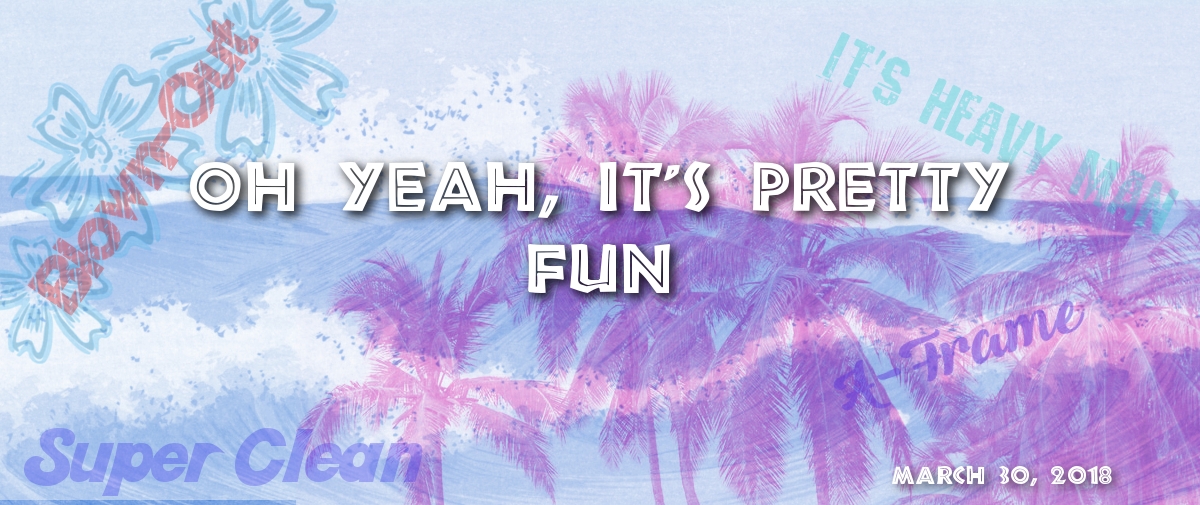The other day I found myself in the company of a regular girl-next-door, who was anything but a surfer. She had me in stitches about how she had just passed through a carpark full of surfers at the local break, who were yelling some pretty strange language to one another, about their experience in the ocean. But the way she described it, was although they were aliens from another planet. I suppose it’s a little true. After all, we are a pretty unique breed, who definitely have our own lingo. Lingo that can be a little hard to comprehend to an outsider.
I imagine it’s a bit like a husband coming home from an epic surf, and attempting to describe all the technical maneuvers he just mastered to his crochet knitting wife. As if the Mars, Venus thing wasn’t enough, she’s hit with another curve-ball. The same curve-ball she probably throws at her salty husband, when she gloats to him about how she nailed the elusive triple-hooked-twist-knot, at the annual Crochet Championships. No Bueno.
Anyway, if you’re somewhat new to surfing, and are trying a little too hard to fit in, or playfully want to impress your surfing partner, take note of the below surfing terms that may fall on your sun-burnt little ears:
“Oh yeah it’s pretty fun”
A frequently used response to the question of how the surf is, thrown about from surfer to surfer. The same term that my girl-next-door raised an eyebrow at. Her question still lingers in my mind “What the heck did they mean, that the surf’s pretty fun?”
And yes, I already detect your brain ticking over too, “I agree with this girl-next-door, is it fun, like a kid in a candy store kind of fun?” Well, that’s not too far from the truth.
If you could set up an imaginary scale in your mind from 1 to 10, then add a “fun surf” somewhere between an “average surf” and a “great surf”, then you might start to grasp an idea of when to bust this one out.

//Photo by: Matthew McCann
//Surfer: Shannon Davidson
While it sounds like a childish expression, it’s used more often than you might care to know. Even Slater casually dishes it out mid-tour. After all, surfing is all about having fun.
Pretty much when any good surfer hears the words, they know what’s up. An irrespirable urge to prioritize a surf check, suddenly boils within their veins.
‘Fun’ can encompass one or all of the following:
- Good but not all-time.
- A surf that stirs emotions such as ‘hell yeah, this is what it means to be a surfer’.
- A surf that takes you to your little happy place, where you might even break into a light skip back up the beach.
- Miles past the point of a miserable grovel in an uncooperative ocean.
- Where your land problems temporarily vanish as your mind is distracted by all the fun going on.
- An eventual breakthrough in a period of terrible, small or onshore wave conditions.
- A surf that doesn’t invoke feelings of frustration, where for whatever reason you can’t catch waves (those times you unleash an embarrassingly loud growl at the wave itself (where you act like the grumpy old man at the nursing home, who loses it at the innocent nurse for not adding enough milk to his Earl Grey tea).
- A session where the wind, tide and swell pretty much align to create super rippable, liquid ramps.
“It’s super clean”
“Clean like a Dettol advertisement?” I hear you ask. Mmm not quite. Listen up. If any one of your surfing idols, or local ripper describes the ocean as being clean, they are referring to the water as being perfectly clean on the surface. This doesn’t mean it’s pumping. Oh no. You can have an entirely clean ocean, but zero swell. Let me help you out:
Clean conditions are:
- Generally, where wind is non-existent, very light or variable, causing absolutely no wind chop, resulting in incredibly smooth surface conditions.
- A body of water which mimics a sheet of glass, where vibrant pastel colors or fluffy white clouds from above, reflect straight off the surface, sometimes making it difficult to establish where the horizon starts and ends.
- Conditions which surfers salivate over, dream over, hope for, wish for and even plead for.
- Sometimes a result of a passing storm, which may cause the wind to suddenly drop off, removing any previous bumps or chop on the surface.
- Can be described for conditions that have less than 10 to 15kts of wind, although this may or may not slip into the ‘kinda clean’ category.
“It’s heavy man”
Don’t, I repeat don’t start using this term, until you understand it in its full context, otherwise you might just become the butt of all jokes amongst the lineup. Heavy is often reserved for big cyclonic swells, long period groundswells, ridiculously shallow reef breaks or places such as Teahupo’o, where the wave breaks below sea level. To be more descriptive…
Heavy is:
- When you take off on a wave so big, thick or steep that it leaves your heart in your throat (insert highly abused cliché: only a surfer knows the feeling).
- Stains that might appear in your board shorts or bikini.
- Pulling into a wave that breaks over a near-dry reef shelf, rock ledge or cliff face, where one wrong move could see you pulverized into human mince.
- Witnessing a lip throw out before you, where your arms at full span couldn’t even get close to measuring the thickness of the thing.
- When you’re standing on a dry sand bank, clutching board at hip, watching in slow motion as a mountain of water moves towards you. As your eye gaze climbs to the top of the pitching lip, you gulp as you realize you don’t only have to get under this one, but there’s also seven more of those waves behind it.
- Your board’s tombstoning in a similar dry sand bank situation, after jumping out of a ridden wave, you’re on the second hold down, but have now used all remaining oxygen in your lungs with another wave still to come.
- All those heavy ocean moments you’d rather be wrapped up in the safety of your mommy’s warm embrace.
- Conditions where even the best in the world, are shaking in their booties at the thought of paddling out.
You see, as surfers we like to hold onto our own unique descriptive words of the ocean, and our experience in and around it. Now that you know the basics, be sure to use these terms in nothing but the right situation. Don’t worry you’ll learn pretty quickly. Especially if the locals hang you up by your undies, on the nearest clothesline for calling it fun when it was absolute rubbish.


